Understanding the Role of Collagen in Skin Health
Collagen is the most abundant protein in our bodies, making up around 75-80% of our skin. It is produced by fibroblast cells in the dermis, the middle layer of our skin. Collagen acts as the scaffolding that supports our skin, providing structure and strength. As we age, our collagen production starts to decline, resulting in a loss of elasticity and the formation of wrinkles. However, when we replenish and stimulate collagen production with the help of collagen cream, we can help restore the youthful appearance of our skin.The Science Behind Collagen
Collagen is made up of amino acids, particularly glycine, proline, and hydroxyproline. These amino acids form triple-helix structures that give collagen its unique strength and flexibility. Collagen is also rich in antioxidants, which help protect our skin from damage caused by free radicals. But what exactly are amino acids? Amino acids are the building blocks of proteins, and they play a crucial role in various biological processes. Glycine, for example, is involved in the synthesis of DNA, RNA, and many important molecules in the body. Proline, on the other hand, is essential for collagen synthesis and wound healing. Hydroxyproline, a modified form of proline, adds stability to collagen by forming strong hydrogen bonds. Antioxidants, such as those found in collagen, are molecules that neutralize harmful free radicals in the body. Free radicals are unstable molecules that can damage cells and contribute to aging and disease. By scavenging these free radicals, antioxidants help protect our skin from oxidative stress and maintain its health and vitality.Benefits of Collagen for the Skin
The benefits of collagen for the skin are numerous. Firstly, collagen improves the skin’s elasticity, making it appear more firm and plump. This can help reduce the appearance of fine lines and wrinkles. Additionally, collagen promotes the production of elastin, a protein that gives skin its ability to stretch and bounce back. With increased elastin production, the skin becomes more resilient and less prone to sagging. Another benefit of collagen is its ability to boost the skin’s hydration levels—which is particularly important for those with sensitive skin. Collagen peptides have a unique ability to bind and retain water, keeping the skin moisturized and preventing dryness. This hydration not only improves the overall appearance of the skin but also helps maintain its barrier function, protecting it from external irritants and pollutants. Furthermore, collagen stimulates the production of other proteins, such as fibrillin. Fibrillin is a glycoprotein that provides additional support to the skin’s structure, enhancing its elasticity and strength. With increased fibrillin production, the skin becomes more resilient to stretching and maintains its shape and firmness. Many people turn to collagen creams to help with their sensitive or oily skin, and the best collagen creams and topical collagen products (possibly enhanced with shea butter) help boost collagen production as well as maintain a youthful glow to the skin. Collagen plays a vital role in maintaining the health and appearance of our skin. By understanding the science behind collagen and its benefits, we can make informed choices to support collagen production and keep our skin looking youthful and radiant.The Importance of Hyaluronic Acid for Skin Hydration
Hyaluronic acid is a naturally occurring substance in our bodies that is responsible for maintaining moisture levels in our skin. It has the ability to hold up to 1,000 times its weight in water, making it an excellent hydrating ingredient for the skin. As we age, our natural levels of hyaluronic acid decrease, resulting in dryness and a loss of plumpness. By incorporating hyaluronic acid into our skincare routine, we can help restore moisture to our skin and maintain a youthful appearance.What is Hyaluronic Acid?
Hyaluronic acid is a glycosaminoglycan, a type of sugar molecule, that is naturally produced by our bodies. Its high water-holding capacity makes it an ideal moisturizer for the skin. Hyaluronic acid is also found in the connective tissues of our bodies, including our joints and eyes, where it provides lubrication and cushioning.Hyaluronic Acid and Skin Moisture
One of the primary functions of hyaluronic acid in the skin is to attract and retain water. It forms a protective barrier on the skin’s surface, preventing moisture loss and keeping the skin hydrated. This helps to plump up the skin, reducing the appearance of fine lines and wrinkles. Additionally, hyaluronic acid helps to improve uneven skin tone and texture, leaving it looking smooth and radiant. Furthermore, hyaluronic acid has been found to have antioxidant properties, which can help protect the skin from environmental damage. It acts as a shield against free radicals, which are unstable molecules that can cause premature aging and skin damage. By incorporating hyaluronic acid into our skincare routine, we can help protect our skin from the harmful effects of pollution, UV radiation, and other environmental stressors. In addition to its hydrating and protective properties, hyaluronic acid also plays a role in wound healing. It helps to promote the production of collagen, a protein that is essential for maintaining the skin’s structure and elasticity. When the skin is injured, hyaluronic acid helps to stimulate the growth of new cells and tissues, aiding in the healing process and reducing the risk of scarring. Moreover, hyaluronic acid has been found to have anti-inflammatory effects on the skin. It can help to soothe and calm irritated skin, reducing redness and inflammation. This makes it an excellent ingredient for those with sensitive or acne-prone skin, as it can help alleviate symptoms and promote a healthier complexion. Lastly, hyaluronic acid is a versatile ingredient that can be used in a variety of skincare products. It is commonly found in moisturizers, serums, and masks, as well as in injectable fillers for more targeted treatment of wrinkles and volume loss. Its lightweight and non-greasy texture make it suitable for all skin types, including oily and combination skin. Hyaluronic acid is a powerhouse ingredient when it comes to skin hydration. Its ability to attract and retain water, along with its numerous other benefits, make it a must-have in any skincare routine. By incorporating hyaluronic acid into our daily regimen, we can help keep our skin moisturized, plump, and youthful-looking.The Synergy of Collagen and Hyaluronic Acid in Face Creams
When collagen and hyaluronic acid are combined in face creams, they work synergistically to provide multiple benefits for the skin. Collagen helps to improve the skin’s structure and elasticity, while hyaluronic acid boosts hydration levels. Together, these two powerhouse ingredients can help reduce the signs of aging, such as fine lines, wrinkles, and dullness.How Collagen and Hyaluronic Acid Work Together
Collagen and hyaluronic acid complement each other’s effects on the skin. Collagen provides the building blocks for a strong and resilient skin structure, while hyaluronic acid ensures that the skin remains adequately hydrated. This combination helps to restore the skin’s youthful appearance by improving firmness, elasticity, and moisture levels. When applied topically, collagen molecules are too large to penetrate the skin deeply. However, they can still provide a protective barrier on the skin’s surface, preventing moisture loss and environmental damage. Hyaluronic acid, with its smaller molecular size, can penetrate deeper into the skin, delivering hydration and promoting collagen production from within. By working together, collagen and hyaluronic acid create a dynamic duo that addresses multiple skin concerns. Collagen rebuilds and strengthens the skin’s structure, while hyaluronic acid ensures that the skin remains plump and hydrated. This combination can help to minimize the appearance of fine lines and wrinkles, improve skin elasticity, and promote a more youthful complexion.Choosing a Cream with Both Ingredients
When selecting a face cream that contains collagen and hyaluronic acid, it’s important to consider the quality and concentration of these ingredients. Look for creams that use high-quality, bioavailable forms of collagen and hyaluronic acid. Pay attention to the concentration of these ingredients as well, as higher concentrations tend to provide more visible results. Additionally, consider the overall formulation of the cream and whether it aligns with your skin type and concerns. Some creams may contain additional beneficial ingredients such as antioxidants, vitamins, or peptides that can further enhance the effectiveness of collagen and hyaluronic acid. It’s also essential to choose a cream that suits your skin type, whether it’s dry, oily, or sensitive, to ensure optimal results. Remember that consistency is key when using face creams with collagen and hyaluronic acid. Regular use, combined with a healthy skincare routine and lifestyle habits, can help maximize the benefits of these ingredients and promote long-term skin health.Top Face Creams with Collagen and Hyaluronic Acid
Now that we understand the importance of collagen and hyaluronic acid in skincare, let’s explore some of the top face creams that harness the power of these ingredients.What to Look for in a Quality Cream
When searching for the best face cream, it’s essential to consider a few key factors. Firstly, look for a cream that contains high-quality, natural ingredients that are known to benefit the skin. Secondly, consider the concentration of collagen and hyaluronic acid in the cream, as well as the overall formulation and texture. Lastly, read reviews and gather feedback from other users to ensure that the cream delivers on its promises.How to Incorporate Collagen and Hyaluronic Acid into Your Skincare Routine
Now that you have discovered the benefits of collagen and hyaluronic acid, it’s time to incorporate them into your skincare routine for optimal results.Best Time to Apply Face Creams
The best time to apply face creams is in the morning and evening, after cleansing and toning your skin. Start by using a gentle cleanser to remove any dirt or impurities from your skin. Follow with a toner to balance your skin’s pH levels and prepare it for the application of active ingredients. Finally, apply a small amount of face cream with collagen and hyaluronic acid to your face and neck, using gentle upward strokes.Complementary Skincare Products
In addition to face creams, there are other skincare products that can enhance the effectiveness of collagen and hyaluronic acid. For example, serums containing these ingredients can provide a concentrated dose of active ingredients to target specific skin concerns. Additionally, using a face mask once or twice a week can provide an intensive treatment to boost collagen and hyaluronic acid levels in the skin.The Final Say
Discovering the best face creams with collagen and hyaluronic acid can greatly improve the health and appearance of your skin. Understanding the role of collagen in skin health, the importance of hyaluronic acid for skin hydration, and the synergy of these two ingredients in face creams is key to selecting the right products for your skincare routine. By incorporating collagen and hyaluronic acid into your daily regimen and using complementary skincare products, you can achieve the radiant and youthful-looking skin you desire.Organixx Clean Sourced Collagens blend contains five types of collagen from four sources. What’s more, it’s combined with targeted nutrients such as zinc, vitamin C, and vitamin B6 which specifically enhance the bioavailability and potency of collagen. Clean Sourced Collagens is formulated from the ground up to enhance and support your body’s natural ability to heal and rebuild itself from the INSIDE out.

Certainly, the idea of mixing collagen powder with yogurt has become increasingly popular in the wellness community. This combination not only adds a protein boost to your day but also offers various health benefits, ranging from improving skin health to aiding in digestion. In this guide, we will delve into the benefits and potential concerns of mixing collagen powder with yogurt, providing you with a comprehensive understanding of this trend.
Whether you’re a health enthusiast seeking to optimize your diet or just curious about new food pairings, this guide offers valuable insights.
Benefits of Mixing Collagen Powder With Yogurt
Collagen is one of the most abundant proteins in our bodies and it’s an important part of all connective tissues. It’s responsible for giving skin its elasticity, providing a cushioning effect for your joints, and even improving digestion. Collagen can be found naturally in foods such as dairy products, fish, eggs, beef, and chicken, but it can also be taken in supplement form.
Yogurt is another nutritional powerhouse that’s loaded with vitamins and minerals. It’s a great source of calcium, vitamin B-12, phosphorus, zinc, and riboflavin, which are essential for the proper functioning of the body. Yogurt also contains probiotics which help to maintain a healthy digestive system.
When these two nutritional powerhouses are combined, the result is an incredibly healthy mix that can provide a number of health benefits. The combination of collagen and yogurt may help reduce inflammation, improve digestion, and boost immunity. Additionally, including both collagen and yogurt in your diet can help maintain healthy hair, skin, nails, and bones.
If you want to boost your health, mix collagen powder with yogurt. It’s a simple and effective combo that offers numerous nutritional benefits. Let’s take a look at some of those benefits:
Nutritional Powerhouse
Adding collagen powder to yogurt amplifies the nutritional value of the snack, making it an ideal choice for those looking to enhance their health and well-being. The high protein content of collagen not only supports muscle recovery and growth but also aids in the maintenance of healthy joints and skin. When combined with the gut-friendly probiotics found in yogurt, this supercharged blend can also promote better digestion and absorption of nutrients.
The vitamins and minerals present in yogurt further supplement the body’s nutrient needs, bolstering the immune system and promoting bone health. This collagen-yogurt mix serves as a great nutritional booster, providing your body with a balanced blend of essential nutrients.
Satiety Boosting Combo
The collagen and yogurt combination is not only nutritionally rich, but it also acts as a powerful satiety-boosting duo. Collagen is a protein, and proteins are known for their ability to induce a feeling of fullness. They slow down the digestion process, keeping you satiated for longer periods, and thereby reducing the urge to snack between meals.
On the other hand, yogurt has a creamy texture and is rich in proteins and fats, which tend to be more satisfying and filling. Moreover, the probiotics in yogurt can enhance your gut health, further influencing satiety signals. Consequently, incorporating a collagen-yogurt combo into your diet can help manage your weight effectively by curbing overeating and unnecessary snacking, all while providing your body with essential nutrients.
Easily Digestible Protein Source
Unlike other protein forms, collagen is hydrolyzed, meaning it’s broken down into smaller molecules, making it easier for the body to absorb. When consumed, collagen peptides are rapidly absorbed into the bloodstream and used by the body to build new collagen structures.
Yogurt, being a fermented food, also aids digestion. The live cultures or probiotics present in yogurt can help break down the protein, further enhancing the absorption of collagen peptides. These friendly bacteria improve overall gut health, fostering a more efficient digestive system. Therefore, consuming collagen powder in a yogurt base not only provides high-quality protein but also ensures ease of digestion, making it an ideal dietary addition for those seeking to enhance their protein intake without straining their digestive system.
Daily Dose of Essential Nutrients
Collagen is a potent source of amino acids such as glycine, proline, and hydroxyproline, essential for the maintenance and repair of skin, bones, and connective tissues. Additionally, it contributes to the health of hair and nails, enhancing their strength and appearance. Yogurt, on the other hand, is packed with vital nutrients like calcium, vitamin B2, vitamin B12, potassium, and magnesium. Besides, the probiotics found in yogurt support a healthy gut microbiome, boosting immunity and aiding in digestion.
Combining collagen powder with yogurt not only delivers high-quality protein but also a spectrum of other nutrients, supporting overall health and wellness.
Types of Collagen Powder
Collagen powder comes in different types, each with its own benefits. It’s like choosing the right flavor for your yogurt. And while there are many more types of collagen, let’s focus on the main three and what they can do for you:
Type I Collagen: Type I Collagen is the most abundant collagen in the human body, contributing to approximately 90% of the body’s collagen. It’s primarily found in areas such as the skin, tendons, organs, and bones. Type I collagen plays a pivotal role in maintaining the elasticity and regeneration of skin, reducing wrinkles, and promoting healthier and youthful-looking skin. Additionally, it aids in the robustness of your tendons, organs, and bones, thereby enhancing overall physical health and resilience.
Type II Collagen: This type of collagen is primarily found in cartilage, which is the connective tissue that cushions our joints. It plays a crucial role in promoting joint health and is particularly beneficial for those experiencing joint-related issues such as arthritis. Consuming type II collagen may help to alleviate joint pain, reduce inflammation, and improve overall mobility.
Type III Collagen: Last but not least, type III collagen is typically found in reticular fibers, such as in the bone marrow. It’s also abundant in our muscles, organs, and arteries, making it essential for maintaining the health and integrity of these structures. Type III collagen is especially crucial for cardiovascular health, as it helps to maintain the strength and flexibility of our arteries. Furthermore, it supports muscle health and recovery, making it beneficial for those engaged in regular physical activity. So, just as a certain type of yogurt might enhance your immune system, Type III collagen plays an essential role in supporting your cardiovascular and muscular systems.
Selecting the Right Type of Collagen for Your Needs
Choose type I collagen for fabulous skin and strong hair and nails, whereas type II collagen is perfect for joint health. And if you want an all-around wellness boost, go for a blend of all three types.
How to Whip Up a Collagen-Yogurt Combo
Mixing collagen powder with yogurt is as easy as 1, 2, 3. Just add a scoop to your yogurt, stir, and enjoy a delicious and nutritious treat. It’s like a flavor and health upgrade for your yogurt. Just follow these simple steps to create a tasty and nutritious treat:
- Choose Your Ingredients: First things first, gather your collagen powder and your favorite plain or flavored yogurt—you can buy unflavored collagen powder so it will taste like whichever flavor of yogurt you prefer! For an extra punch of protein, go for Greek yogurt.
- Add Collagen to Yogurt: Now, sprinkle in a scoop of collagen protein powder (or follow the recommended serving size). Don’t go overboard or you might mess with the taste and texture.
- Mix it Up Real Good: Time to get your mixing skills on point. Stir like there’s no tomorrow until everything blends together into a smooth and creamy delight.
- Taste Test & Adjust if Needed: If it’s not quite hitting the spot, fear not. Sweeten things up with a drizzle of honey or some fresh fruit. Craving more creaminess? Add a dollop of nut butter or avocado.
Get Creative With Toppings and Mix-Ins
You can really get tasty here! Sprinkle on some crunchy nuts or shredded coconut, add a spoonful of unsweetened cocoa powder for a chocolatey kick, or even throw in some spices like cinnamon or cardamom. Have fun with it and make your yogurt one of a kind!
Here are some other suggestions to get you going:
- Fresh fruits like berries, bananas, and peaches bring natural sweetness and fiber to the party.
- Nuts, for instance, almonds and walnuts, offer beneficial fats while chia seeds have omega-3 fatty acids.
- Spice things up with a sprinkle of cinnamon or turmeric for unique flavors and added health benefits.
- If you’re seeking something sweet, be mindful of the high sugar content in honey or maple syrup and use it sparingly.
By following these steps, you’ll create a collagen-yogurt combo that’s bursting with flavor and packed with essential nutrients. Remember, listen to your body and find the balance that works best for you.
Health Benefits of Collagen-Yogurt Mixture
We already mentioned some of the fantastic nutritional benefits that collagen can have when added to your favorite creamy treat, now let’s take a look at some of the added bonuses of using a collagen supplement:
- Improved Digestive Health: Yogurt’s probiotic content promotes healthy gut bacteria. When combined with the amino acids in collagen powder, it helps improve digestion and reduce inflammation in the digestive tract.
- Skin Health Enhancement: Collagen maintains skin elasticity and hydration. Regularly consuming collagen-yogurt mixtures may improve skin texture, reduce wrinkles, and increase moisture levels. The lactic acid in yogurt aids exfoliation and stimulates new cell growth for healthier-looking skin.
- Bone & Joint Health Support: Studies show collagen supplements can increase bone mineral density (BMD) and reduce markers of bone breakdown. A collagen-yogurt mixture may also alleviate joint pain due to its anti-inflammatory properties.
- Muscle Mass Maintenance: Amino acids are essential for muscle repair and growth, especially as we age or engage in physical activity. A serving of protein-rich Greek yogurt mixed with collagen powder after your workout aids recovery by providing these necessary nutrients.
- Nutrient-Rich Snack Option: This combo serves as an excellent nutrient-dense snack. Yogurt contains calcium, B vitamins, and potassium while adding Organixx’s clean & organic collagen supplement boosts the nutritional value even more.
Incorporating simple yet effective lifestyle changes like adding a scoopful of quality sourced collagen into your favorite bowlfuls can go a long way towards achieving better health outcomes.
FAQs: Can I Mix Collagen Powder With Yogurt?
Can I mix vital proteins with yogurt?
Yes, you can. Vital proteins like collagen powder blend well with the creamy texture of yogurt.
Is collagen good in yogurt?
Absolutely. Collagen enhances the nutritional value of yogurt, providing benefits for skin health and joint function.
What cannot be taken with collagen?
Certain types of medication such as antibiotics may interfere with collagen absorption. Always consult your healthcare provider first.
Can you take collagen with dairy?
You certainly can. Dairy products like milk and cheese complement the taste and texture of collagen supplements.
The Bottom Line
In summary, incorporating collagen powder into your yogurt presents a fantastic way to enhance its nutritional value. This combination not only offers a protein-rich, nutrient-dense snack but also provides remarkable health benefits, including support for skin health, bone and joint function, and muscle mass maintenance. Always remember to consult your healthcare provider when introducing any supplement into your diet, such as collagen, especially if you’re taking other medications. So, make the most of your yogurt by adding a scoop of collagen and enjoy both its enhanced flavor and boosted health benefits.
Remember to choose high-quality products and get creative with flavors and toppings to find your perfect blend!
Organixx Clean Sourced Collagens blend contains five types of collagen from four sources. What’s more, it’s combined with targeted nutrients such as zinc, vitamin C, and vitamin B6 which specifically enhance the bioavailability and potency of collagen. Clean Sourced Collagens is formulated from the ground up to enhance and support your body’s natural ability to heal and rebuild itself from the INSIDE out.

“Our bodies gradually make less collagen as we age, but collagen production drops most quickly due to excess sun exposure, smoking, excess alcohol, and lack of sleep and exercise. With aging, collagen in the deep skin layers changes from a tightly organized network of fibers to an unorganized maze.”
Harvard School of Public Health
Collagen is the most abundant protein in the human body, making up about a third of the total protein. That’s because it’s found just about everywhere! From muscles to bones to skin and nails, collagen is a key part of the body’s connective tissue.
While we tend to think of collagen as something that keeps our skin looking young and plump, it actually plays an important role in many different areas of the body. Collagen is responsible for giving our skin its elasticity and strength, as well as helping to repair any damage that might occur. It’s also essential for the health of our bones, joints, and gut.
In this article, we’ll dive a little deeper into what collagen is and how it works to maintain a healthy and functioning body.
What is collagen?
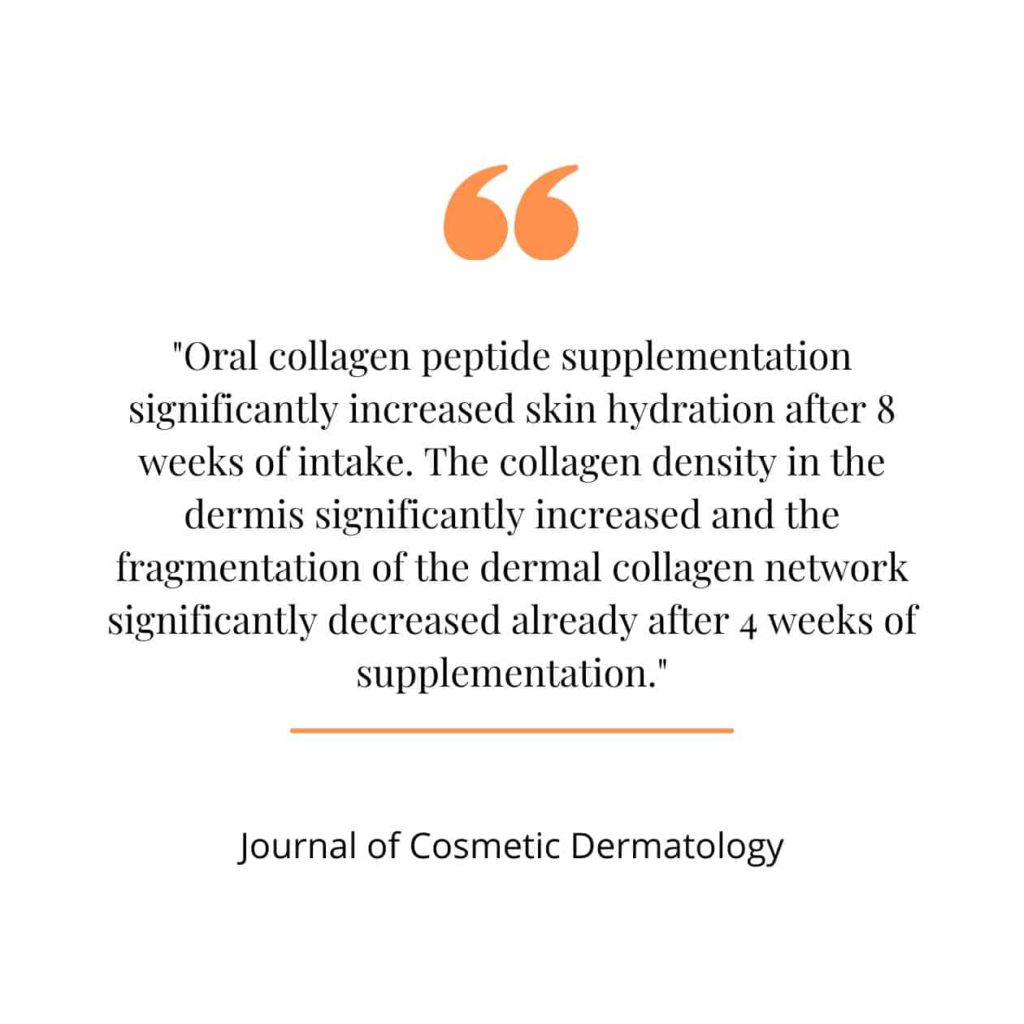
You probably know collagen as a key ingredient in some beauty creams and serums. But what exactly is it? And does it really work?
Collagen is a protein that’s found throughout your body, from your skin to your bones. It’s responsible for creating that youthful “plump” look, as well as giving skin its elasticity and strength.
As we age, our bodies produce less collagen, which leads to wrinkles and sagging skin. That’s where collagen supplements come in. By taking collagen daily, you can help reduce the signs of aging and promote healthy, glowing skin. So if you’re looking for a way to turn back the clock, collagen just might be the answer.
Where does collagen come from?
Collagen is a major component of skin, bones, tendons, ligaments, and other connective tissues. It helps maintain flexibility and strength in these structures. Collagen is made up of three proteins called tropocollagen, proline, and glycine. These proteins form long chains called fibrils.
Collagen fibers are arranged in bundles called fascicles. In humans, collagen is produced primarily in the dermis, the layer of tissue beneath the epidermis, or the skin.
What is collagen made of?
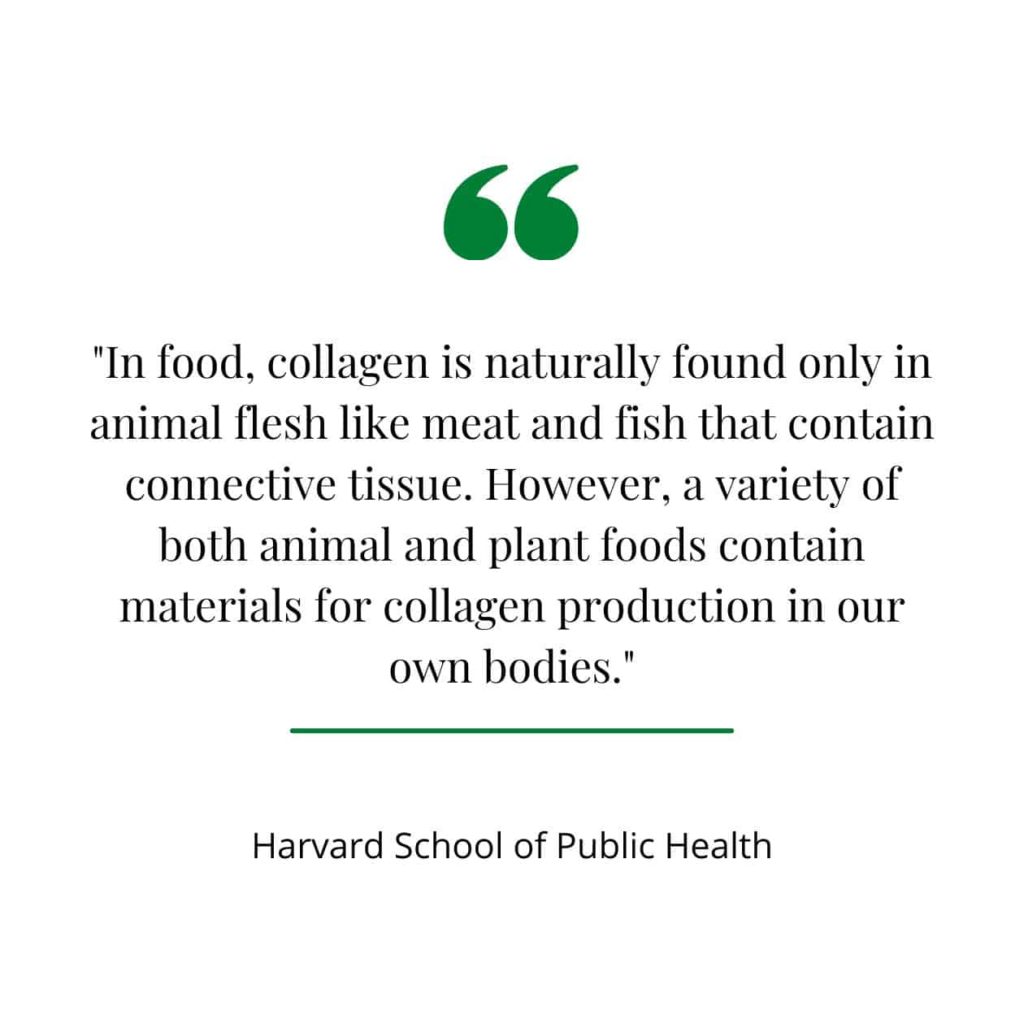
As we mentioned, collagen is made up of three proteins: tropocollagen, proline, and glycine. Tropocollagen is the main structural protein found in collagen. It’s made up of two other proteins, proline and glycine. Proline makes up about 20% of the amino acids in tropocollagen, while glycine makes up about 50%.
Glycine is also the simplest amino acid, and it’s responsible for giving collagen its unique structure. This structure allows collagen to form strong bonds with other proteins, which is what gives it its strength.
What does collagen do?
For the most part, collagen helps keep our skin looking young and healthy. It gives our hair strength and thickness, and it keeps our nails strong. It also helps maintain the flexibility and strength of our bones, ligaments, and tendons. Basically, what doesn’t collagen do!
What are the different types of collagen?
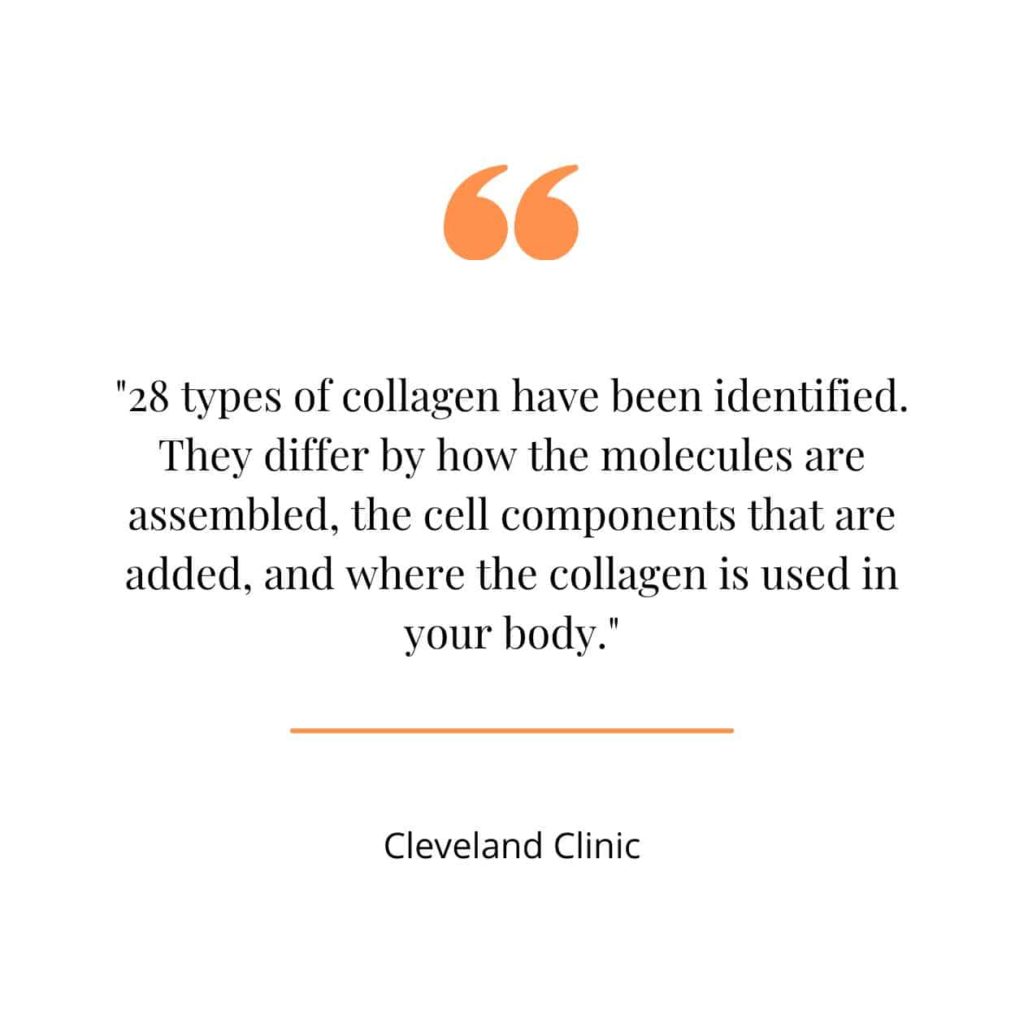
Collagen is a protein that helps our bodies stay strong. There are three main kinds of collagen. Types 1, 2, and 3 make up the majority of the human body. These are the most abundant types of collagen in the body.
Type I collagen is a major structural protein found in the extracellular matrix of connective tissue. It’s composed of two left-handed helical chains that coil around each other to form a triple helix. Supplementing with type I collagen has been shown to improve skin health, reduce inflammation, and support healthy joints. Additionally, type I collagen is readily available from animal sources, making it an easy and convenient way to improve your health as you age.
Type II collagen is a structural protein found in cartilage. It’s made up of two left-handed helical chains that twist around each other to form a double helix. Type II collagen supplements have been shown to reduce joint pain and stiffness, and slow the progression of osteoarthritis.
Type III collagen is a structural protein found in skin, muscles, and blood vessels. It’s made up of two left-handed helical chains that coil around each other to form a triple helix. Type III collagen supplements have been shown to improve skin elasticity and reduce the appearance of wrinkles. Additionally, type III collagen is readily available from animal sources, making it an easy and convenient way to improve your skin health as you age.
Scientifically proven ways to increase collagen production
There are several ways to increase collagen production and slow the aging process. Here are a few scientifically proven methods:
Although our bodies produce collagen naturally, the production of collagen declines as we age. This leads to the formation of wrinkles, fine lines, and other signs of aging.
1. Eat a diet rich in vitamin C: Vitamin C is a key nutrient for collagen production. It helps the body synthesize collagen and provides antioxidant protection against free radical damage. Free radicals can break down collagen, leading to wrinkles and other signs of aging. Foods that are rich in vitamin C include citrus fruits, bell peppers, broccoli, kale, and strawberries.
2. Get enough sleep: Sleep is important for overall health, and it also plays a role in collagen production. When we sleep, our bodies produce more human growth hormone (HGH), which helps to stimulate collagen production. Additionally, sleep deprivation has been shown to increase the breakdown of collagen.
3. Exercise: Exercise is good for your health in many ways, and it also helps to increase collagen production by delivering the proper nutrition via exercise. When we exercise, our bodies produce more HGH, which helps to stimulate collagen synthesis. Additionally, exercise has been shown to reduce the breakdown of collagen.
4. Limit sun exposure: Ultraviolet (UV) radiation from the sun can damage the skin and lead to wrinkles and other signs of aging. It’s important to limit sun exposure and wear sunscreen to protect the skin. Additionally, UV radiation has been shown to break down collagen.
What are the benefits of collagen for your body?
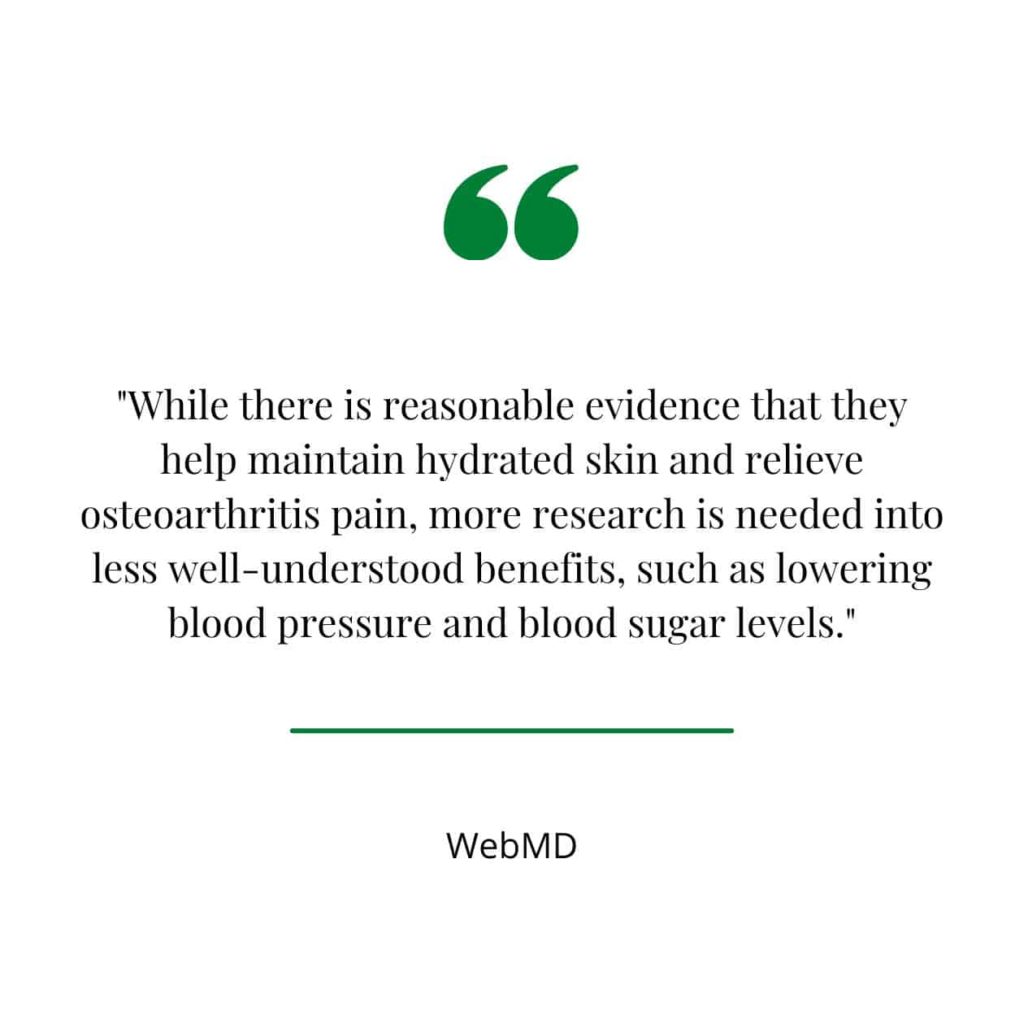
Collagen is a vital protein found in our bodies. It provides structural support to our muscles, bones, ligaments, tendons, cartilage, blood vessels, and skin. When collagen is combined with other proteins, it creates stronger connective tissue, making our skin more resilient.
Can you eat collagen?
Yes, collagen is a food protein and is safe to eat. Collagen supplements are typically made from animal sources, such as bovine or fish. However, there are also vegan collagen supplements made from plant-based sources, such as soy.
Collagen supplements are available in powder, tablet, and capsule form. They can be added to smoothies, juices, soups, and other foods.
How can you get more collagen?
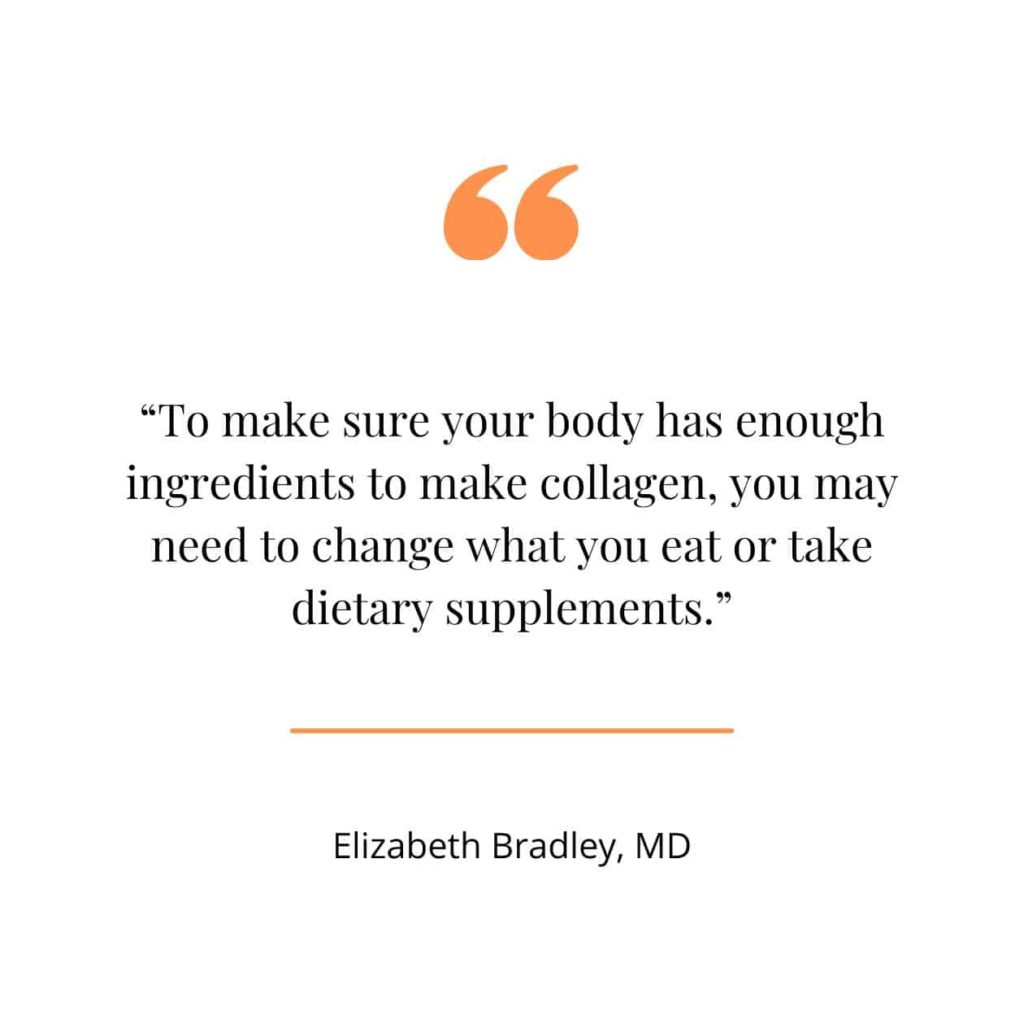
There are plenty of ways you can attempt to boost your natural collagen production. This includes things like taking clean-sourced, organic collagen supplements in the form of pills, powders, or beverages, eating collagen-rich foods, using topical collagen treatments, and protecting your skin from UV damage.
While some of these methods may be more effective than others, taking measures to protect your existing collagen is just as important as increasing production. This includes things like avoiding excess sugar, managing stress levels, sleeping enough, and not smoking.
Food containing collagen
If you don’t like the idea of dissolving powders or taking a pill, you’re in luck! There’s ample collagen to be found in foods that you eat on a daily basis!
Some foods that contain collagen include:
- Bone broth
- Fish
- Organ meats
- Eggs
- Dark leafy greens
- Citrus fruits
- Berries
- Garlic
- Green tea
Is bone broth healthy?
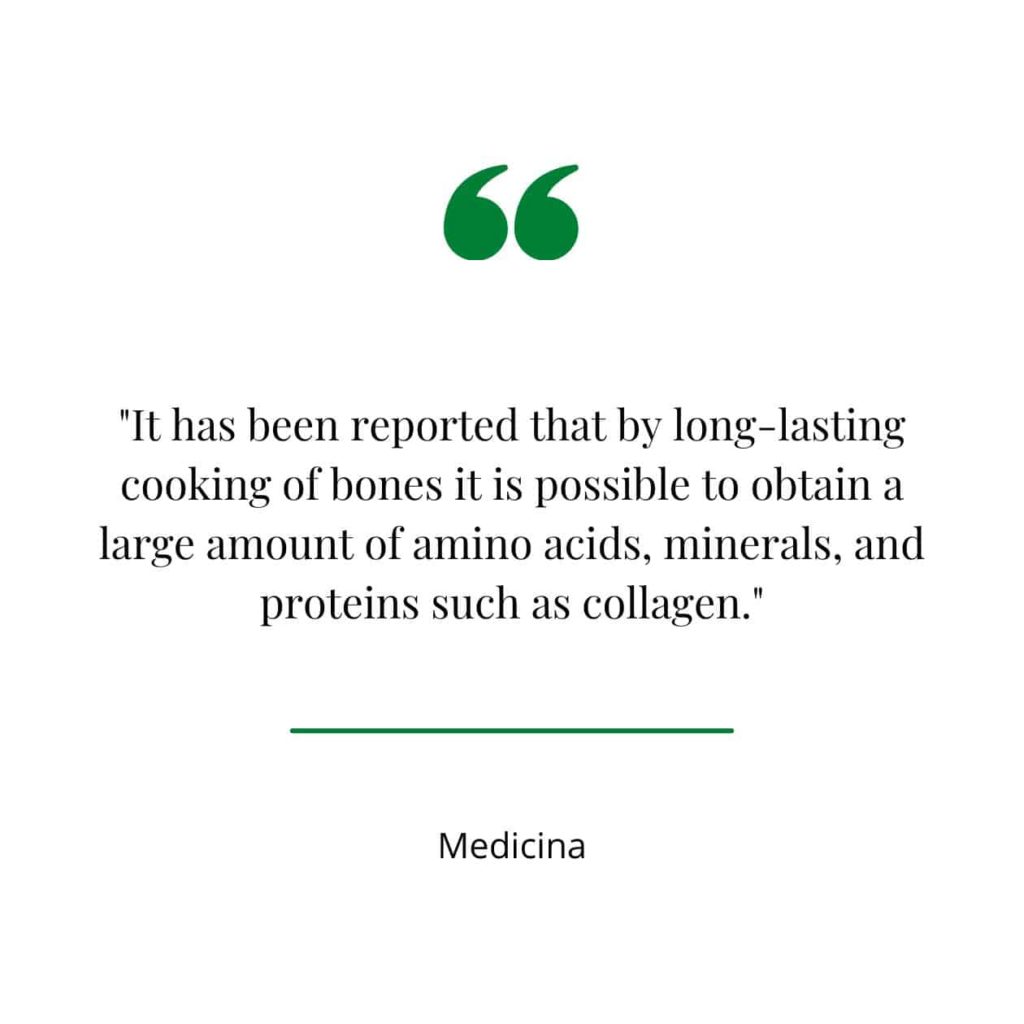
Bone broth is a healthy food that’s rich in collagen. It’s also a good source of other nutrients, such as amino acids, minerals, and gelatin. Bone broth can be made at home using bones from chicken, beef, or fish. It can also be purchased online or at some health food stores.
Potential health benefits of collagen supplements
While more research is needed, reviews of those currently using collagen supplements have noticed several benefits to boosting their collagen intake. These include:
1. Strong Cartilage and Muscles
Hydrolyzed collagen supplements have been shown to improve joint pain and stiffness in people with osteoarthritis. Additionally, it may help to build muscle mass and reduce the risk of exercise-related injuries.
2. Healthy Teeth
One benefit that many people don’t know about taking collagen supplements is the support it gives to the teeth and enamel! The collagen found in these supplements helps to reduce the risk of tooth decay and gum disease and keep those chompers looking as strong as ever!
3. Thick Hair
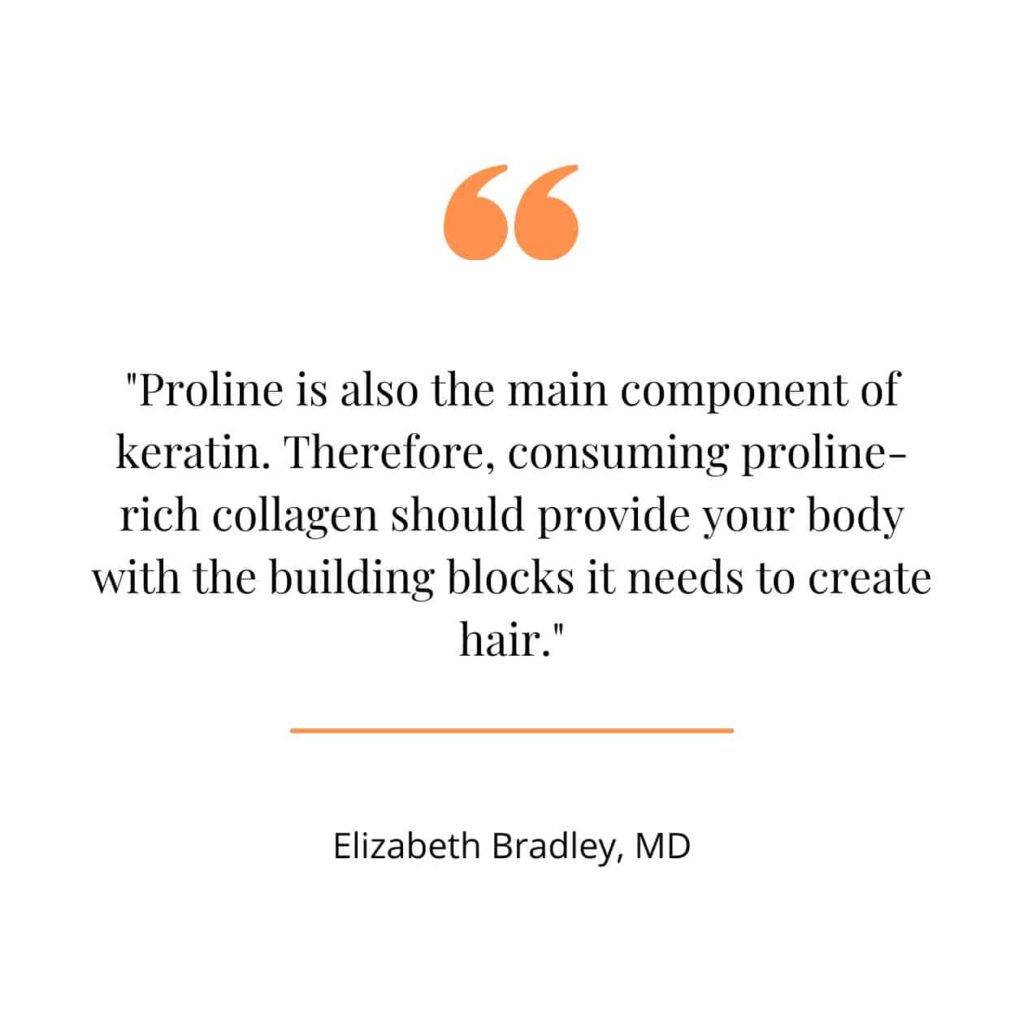
Another external beauty-related benefit that comes from taking collagen supplements is the promotion of thick and lustrous hair, as well as strong nails. This is due to the fact that collagen is a key structural protein in both of these areas.
4. Smooth Skin
Of course, one of the most popular reasons people take collagen supplements is for the improvement of the skin when administered topically. This includes a reduction in wrinkles, dryness, and other signs of aging. Additionally, it can help to heal wounds and scars more quickly.
Potential risks of collagen supplements

There are very few risks associated with taking collagen supplements. However, it’s important to note that they may not be suitable for everyone. For example, those who are allergic to fish or other seafood may want to avoid marine-based collagen supplements. Additionally, people with shellfish allergies should avoid supplements made from oysters.
It’s also important to speak with a healthcare professional before taking any type of supplement, especially if you have a medical condition or are taking medication. This is because collagen supplements may interact with certain medications, such as blood thinners.
How to help your body create collagen naturally
There are two basic kinds of collagen. The first is endogenous collagen, which is naturally produced and synthesized by the body. The other is exogenous collagen which comes from an outside source such as pills and powders in supplement form as well as directly from animal products, such as bone broths.
Unfortunately, it’s part of the “normal” aging process that by the time we reach around age 30, our natural, endogenous collagen production begins to wane. For most people who chose to eat the Standard American Diet (SAD) and live a sedentary yet stressed-out lifestyle, it pretty much goes downhill from there.
As internally created collagen production lessens, the result is not only wrinkles and sagging skin, but also joint pain, aching muscles, blood pressure issues, digestive complications, and increased susceptibility to many kinds of chronic disease. There is a light at the end of the tunnel, however.
As with any essential substance, it is always best to eat a diet and live a lifestyle that promotes the healthy synthesizing of your own natural healing and repair mechanisms. This goes for collagen production as well.
To Sum Up
The main takeaway of this article is that collagen is an important structural protein that offers a wide range of health benefits. It’s found in the connective tissues of animals, including the skin, muscles, tendons, and bones. Collagen supplements have become increasingly popular in recent years due to their potential ability to improve joint pain, skin health, gut health, and more. However, it’s important to speak with a healthcare professional before taking any type of supplement. Additionally, there are ways to help your body create collagen naturally by eating a healthy diet and living an active lifestyle.
If you’re interested in beginning your journey of collagen supplementation, reach out today! Browse through plenty of clean-sourced, organic collagen products and find something that’s going to work for you!
Organixx Clean Sourced Collagens blend contains five types of collagen from four sources. What’s more, it’s combined with targeted nutrients such as zinc, vitamin C, and vitamin B6 which specifically enhance the bioavailability and potency of collagen. Clean Sourced Collagens is formulated from the ground up to enhance and support your body’s natural ability to heal and rebuild itself from the INSIDE out.




